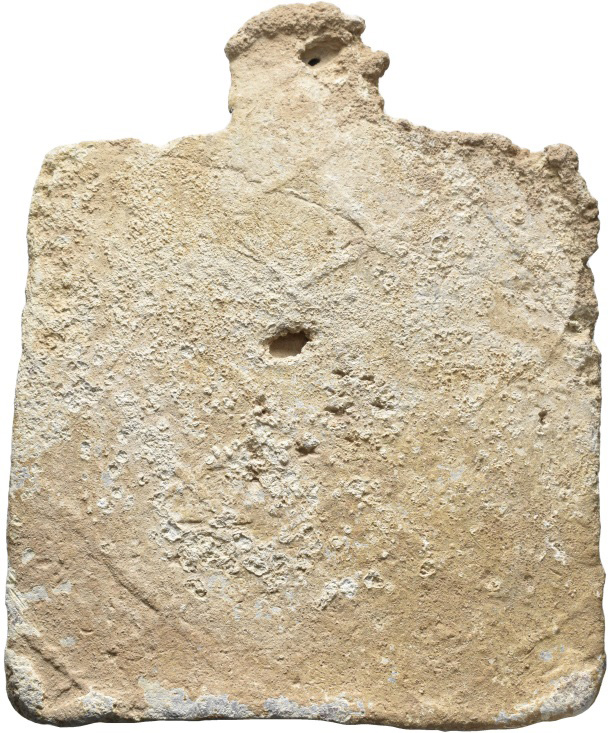
-
Copyright credit: Auction Leu 2021

-
Copyright credit: Auction Leu 2021

-
Copyright credit: Auction Leu 2021

ARCHAEOLOGICAL DESCRIPTION OF THE WEIGHT
Authority
Mint
Marathos
Denomination
50 Sheqels
Material
Lead
Manufacture
Cast
Shape
Square
Length
7.60 cm
Width
7.60 cm
Height
- cm
Metrology
| Mass (g) | Mass (grain) | Date of measurement | Reference | fragmented | cleaned | reference weight |
|---|---|---|---|---|---|---|
| 460.00 | - | - | Auction Leu 2021 | No | No | Yes |
Iconography
| Symbol | Technique | Direction | Position | Number | Synecdoche |
|---|---|---|---|---|---|
| Lattice pattern | Relief |
Wear
Corrosion
Handle
Yes
Suspension hole
No
Recarved mould
No
Recarved weight
No
Intentionally destroyed
No
Archaeological description
Auction Leu 2021: Marathos, 3rd-1st centuries BC. Weight of 50 Shekels (Lead, 76x76 mm, 460.00 g). City monogram composed of 'mrt' above '20+20+10' (all in Phoenician). Rev. Blank. Pondera 12902. Good very fine.
Autopsy
No
INSCRIPTION
| Language | Technique | Legend type |
|---|---|---|
| Phoenician | Relief | Denomination, Mint |
Fac simile
{Monogram of Marathos: U+1090C+10913+10915}
{Phoenician number 40, U+10918, U+10918}{Phoenician number 10, U+10917}
Edition
mrt | 50. — “Marathus, 50 (Sheqels).”
Monogram
MRT
ARCHAEOLOGICAL CONTEXT
Findspot (region)
Findspot (site)
context
CIRCUMSTANCES OF ACQUISITION
Region
City
Date of first acquisition
Jan. 1, 2005
circumstances
Antiquities trade. Auction Leu 2021: From a European collection, formed before 2005.
DATING OF THE WEIGHT
Curatorial Section
NEAR EASTERN
,
GREEK
Time frame
FROM
-300
TO
-1
Comments on Chronology
COLLECTION HISTORY
Collection
| Name | Date of acquisition | Inventory number |
|---|---|---|
| Antiquities Trade | Dec. 20, 2021 | None |
Bibliography
| Reference | Page/Column | Reference (number) | Plate / Figure | Comment |
|---|---|---|---|---|
| Auction Leu 2021e | None | 3959 | None | None |
VARIA
Additional comment
Auction Leu 2021: The Phoenician city of Marathos lay on the Levantine mainland in close proximity to its rival, the island polis of Arados. Periods of independence alternated with domination by its powerful neighbor, which considered Marathos part of its mainland peraia. The Aradians eventually destroyed Marathos in the late 2nd or early 1st century BC, as reported by Strabo: '[...] Marathus, the latter an ancient city of the Phoenicians, now in ruins. Aradians divided up this country among themselves [...]' (Strab. XVI, 753). Rebuilt on a smaller scale sometime thereafter, the settlement never fully recovered and was eventually abandoned in the late 1st or early 2nd century AD.
Permalink
External link